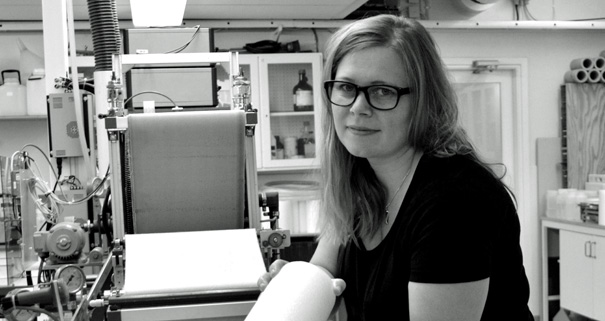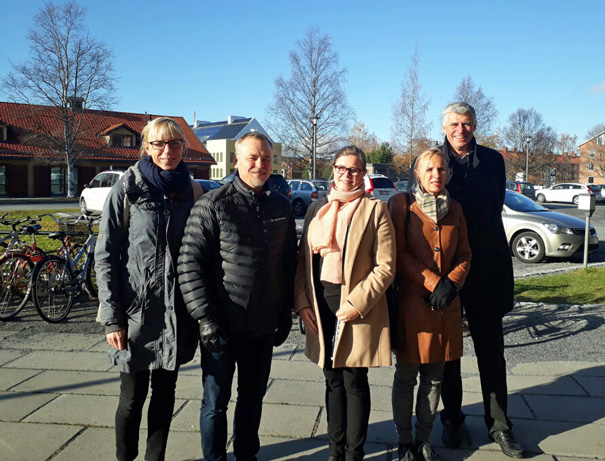Cellulose Replaces Plastic in Future Packaging Material
![]() Print this Article | Send to Colleague
Print this Article | Send to Colleague
Mid Sweden University in Sundsvall, Sweden, and MoRe Research in Írnsköldsvik, Sweden, are cooperating with the Norwegian research institute RISE PFI on the PlastiCel project. The aim is to develop composite materials from nanocellulose and cellulose, which can be used as a barrier for heat, air, and moisture. This means that products such as fish trays which are mostly made from plastic today, might in the future consist of temperature isolating composite materials made from cellulose and nanocellulose, with good barrier characteristics against air and moisture.
The aim is to develop a packaging which can withstand long transports and thus could be used to transport fish. The packaging is coated with a thin film made from plasticized cellulose and nanocellulose, giving a barrier against oxygen. The core of the packaging is a foam made from plasticized cellulose and nanocellulose, giving isolating characteristics to retain a low temperature in the packaging during transport.
"At Mid Sweden University, we conduct basic research on composite materials made from cellulose and nanocellulose," said Magnus Norgren, professor, chemical engineering, Mid Sweden University. "We really look forward to this cooperation and hope that we together with our partners can deepen the research further while at the same time develop new products which may replace fossil based plastic in the society."
Malin Brodin, research scientist at RISE PFI, noted that "to reduce the vast amounts of plastic which end up in the oceans, it is important to replace plastic in all applications where it is feasible. Cellulose is biologically degradable in nature and is a good alternative raw material for plastic films and isolating foams for packing."
Maria Edblad, market coordinator at MoRe Research, explained that "PlastiCel is one more nanocellulose project where our experimental paper machine will be important for production of interesting materials with nanocellulose as a key component."
PlastiCel is a Swedish-Norwegian research project with researchers from RISE PFI in Trondheim, Mid Sweden University in Sundsvall, and MoRe Research in Írnsköldsvik. Industry partners are SCA, Domsjö Fabriker, Essge-Plast, Ranheim Paper and Board, Tommen Gram, and BEWi. The project is financially supported by the EU regional development fund Interreg.

Maria Edblad shows examples of what PlastiCel materials will look like during production on MoRe’s experimental paper machine.

The PlastiCel project group (l-r): Ulrika Andreasson (SCA), Magnus Norgren (Miun), Maria Edblad (MoRe Research), Kristin Syverud (RISE PFI), and Bo Westerlind (Miun).
For more information, contact: Magnus Norgren, professor, Mid Sweden University, telephone 010-142 88 77; Malin Brodin, research scientist, RISE PFI, telephone +47 466 12 099; Anna Svedberg, research manager, MoRe Research, telephone 0660-750 41; Maria Edblad, market coordinator, MoRe Research, telephone 0660-750 48.
Mid Sweden University is a place with a lot of energy and warmth where people can meet, be inspired, and think in new ways. Campuses are situated in Sundsvall and Ístersund and offer a wide variety of programs and courses on all levels, including research.
RISE PFI is an internationally acknowledged research institute within processes and products based on lignocellulose. RISE PFI’s focus areas are biorefining and bioenergy, fiber technology and applications, nanocellulose and carbohydrate polymers, and biocomposites. RISE PFI AS is part of the Swedish research institute RISE (Research Institutes of Sweden AB). Altogether, RISE has 2,200 employees in six divisions, where RISE PFI is part of the RISE Bioeconomy division.
MoRe Research is a neutral and independent research and development company in the field of product and process development, mainly for the pulp and paper industry. Focus areas are wood raw material, pulp development, paper, packaging material, hygiene papers, nanocellulose, biorefinery development, as well as cellulose derivatives like viscose, acetate, ethers, and MCC and research within these areas. MoRe Research is based in Írnsköldsvik, Sweden.


